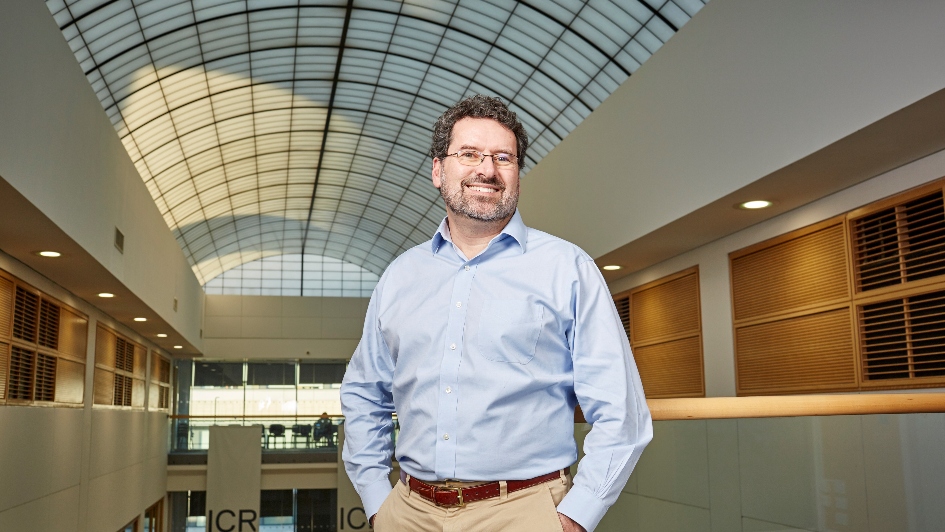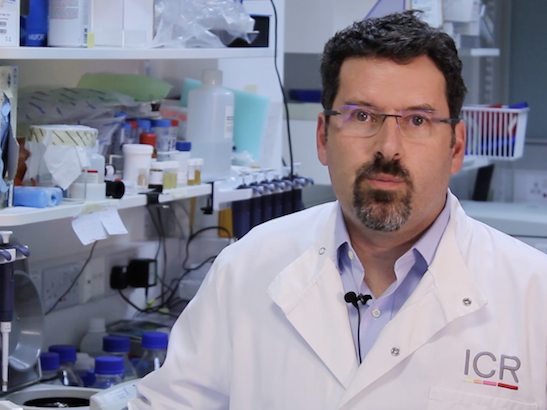
Image: Professor Louis Chesler
In the UK, 1,800 children aged 14 or under are diagnosed with cancer each year. Cancer in children is less well understood than other cancers, mainly because this group of cancers are relatively less common and diverse.
A driving area of focus for Professor Chesler’s team, working closely together with our family charity partners, is ensuring that children with cancer can benefit from precision medicines in the same way as adults.
The centre is driven by a real ‘bench to bedside’ approach – focusing on bringing academic discoveries forward to change clinical practice as quickly as possible and advancing the treatment options available for children with cancer.
A major new discovery
A new cancer drug, fadraciclib, is a great example of the team’s research in action. Discovered at the ICR, fadraciclib has already shown promise in treating a range of cancer types, including some blood cancers and solid tumours. The drug is now being tested in early clinical trials targeting blood cancers like leukaemia.
Fadraciclib targets two proteins, CDK2 and CDK9, which help cancer cells to survive and develop resistance to drug treatment. Professor Chesler’s lab spotted the promise the drug’s mechanism could have for treating neuroblastoma – a type of cancer that mostly affects babies and young children.
Neuroblastoma is often driven by high levels of the cancer-causing gene MYCN. Inhibiting the cancer-driving proteins CDK2 and CDK9 can play an important part in stopping over-zealous activity from the MYCN gene, causing cancer cells to die.
New hope for children with neuroblastoma
Professor Chesler’s team was able to show in early tests in the lab that fadraciclib was highly effective in arresting cancer cell growth in neuroblastoma. These promising initial results have led to funding for a new international clinical trial to go ahead for children with neuroblastoma.
Enrolment of patients to the trial will be driven by the Cancer Research UK Stratified Medicine Programme, which Professor Chesler leads nationally. The trial will include a series of liquid biopsies to monitor whether MYCN is specifically targeted by the drug – a first for paediatric clinical trials. Dr Lynley Marshall, Consultant in Paediatric and Adolescent Oncology Drug Development, is the clinical lead at The Royal Marsden.
The speed at which a clinical trial of this novel drug has reached children exemplifies the success of Professor Chesler’s approach in collaborating across different areas of drug discovery and clinical medicine.
Professor Chesler said:
“In the past, children have had to wait much longer than adults to get access to drugs which could save their lives. Our centre is leading the way in showing this doesn’t have to be the case, and that we can take new developments in science straight to young patients and their families.”
Increasing access to targeted medicines
Professor Chesler is also leading efforts to ensure new drugs are available for young patients on a national scale, by improving our ability to match each child diagnosed with cancer in the UK to the latest targeted drugs.
He has established an ambitious national programme of genome sequencing – guided by a gene panel test which his team developed together with Dr Mike Hubank, Head of Clinical Genomics (Research) in the NIHR Centre for Molecular Pathology at The Royal Marsden.
This test, now integrated into standard NHS practice - was made possible thanks to generous funding from our family charity partners, including Christopher's Smile – a charity set up by Kevin and Karen Capel after they lost their son Christopher to a type of children’s brain tumour called medulloblastoma in 2008.

Image: Kevin and Karen Capel with their son Christopher
Christopher's Smile have played a crucial role through their support for Professor Chesler’s work to open out access for children to many more precision drugs.
The gene panel test enables scientists to read the DNA sequence of 91 genes that play a key role in tumours’ growth and spread. Of 223 children’s tumour biopsies tested around the UK last year, over half had mutations that could potentially be treated by adult cancer drugs.
Karen Capel said:
“This test Professor Chesler and colleagues at the ICR developed is a first for children. We believe gene sequencing is the key foundation stone in enabling personalised medicine, and it will help to bring new treatments for children a step closer.”
Kinder, smarter testing and treatments
In addition, the team has started to test for cancer gene mutations in DNA released from tumours into the bloodstream. Blood tests are able to detect more mutations, more effectively, than traditional tumour biopsies – while offering a less stressful experience for young patients.
Together with Dr Hubank and colleagues at the Genome Hub at The Royal Marsden, the Pediatric Centre is also working closely with Professor Andrea Sottoriva, Director of our Centre for Evolution and Cancer, to bring real-time monitoring of both tumour tissue and liquid biopsy into frontline clinical care.
This approach includes using repeated blood testing to monitor how tumours evolve in response to therapies – which will be particularly useful in cancers where it can be hard to take a biopsy because of the position of the tumour.
Professor Chesler is passionate about doing better for young patients. He says:
“We have shown that we have the scientific knowledge and technology to get children access to state-of-the-art testing and treatments. It is now essential to define in realtime and in great detail, how children’s cancers evolve at all phases of treatment. The ability to integrate these new technologies effectively into clinical patient care will maximise the chance that next-generation cancer drugs will work for childhood cancers. We hope that our centre is leading in these approaches which promise to deliver a better future for young patients and their families.”
How you can support our research
We are a charity and rely on the support of partners, Trusts and Foundations, and individuals to fund our work.
If you would like to get involved and support our childhood cancer research contact Nicola Shaw in the Development Office: [email protected]
